This is from our Letters From The Founder publication.
Dear America Network –
Have you read all your text messages lately? If not, double check that you were not “mistakenly” added to a group chat about dropping bombs in the Middle East.
Maybe you heard this week about “Signalgate,” “another hoax,” or discussion of ‘classified war plans,’ depending on which source of information you defer to. Nevertheless, I’m going to lay out the basic facts in this letter, my read in between the lines based on the information made public to this point, and the story that actually matters here. But to start, what happened in short was that high-level Trump administration officials accidently leaked a highly sensitive, and timely – as in, down to the hour and minute of missile strikes – national security discussion to the press in near real-time (note, I’ll share all of those texts for your reference at the end of this letter).
This basic fact has not been disputed. However, beyond that is where the political machines spin up to create a whirlwind of blame shifting that causes sane Americans to tune out and flip to March Madness or The White Lotus. Since this is a Republican administration, Democrats have seized on this blunder to make a potent example of “incompetence,” and even charges as extreme as “espionage.” To be sure, Republicans would do much the same, as it would be considered political malpractice in Washington to let a good crisis go to waste. It’s rarely the case, but this is one of the few occasions where raising some political hell is entirely justified – if for no other legitimate reason than to make the political PR so painful that it deters future mistakes like these.
Typically, as I’ve discussed before, I disregard much of our domestic political infighting as irrelevant to the real strategic challenges America faces as a nation. However, there is a story in this particular situation that matters – it’s just not the one you’re seeing in headlines. Americans deserve truth and substance. So, let’s get past the spin and cut to what matters and why.
The Facts
Fact #1. The portion of the text conversation that leaked took place over the course of three days, leading up to the initial U.S. strike in Yemen on Saturday, March 15th. The military operation is still ongoing, with strikes occurring daily, and is targeted at a terrorist group in the region called the ‘Houthis.’ U.S. strikes against the Houthis began off-and-on under the Biden administration over a year ago in January 2024. This most recent strike marked a continuation of that military campaign, now under the Trump administration.
The background for these strikes, in short, is that the Houthis have been creating chaos for military and commercial ships transiting a key shipping lane in the Middle East for well over a year. They claim solidarity with another terrorist group, ‘Hamas,’ as well as the Palestinian people in Gaza, and say that they will continue targeting ships in the Red Sea until the war in Gaza stops. For more background on the geopolitics at play here, you can go to our Grand Strategy series here to get the full story, including maps and analysis of the situation.
Fact #2. On Thursday, March 13th, National Security Advisor Mike Waltz created a Signal chat group that included 19 members. President Trump was not on the group chat, but pretty much everyone else in the administration that mattered for the topic of discussion, was. That primarily included Vice President JD Vance, Secretary of State Marco Rubio, top national security officials Secretary of Defense Pete Hegseth, Director of National Intelligence Tulsi Gabbard, and Director of the CIA John Ratcliffe, as well as Treasury Secretary Scott Bessent, White House Chief of Staff Susie Wiles, Deputy Chief of Staff for Policy Stephen Miller, and Special Envoy to the Middle East Steve Witkoff.
Fact #3. In addition to these intentional additions to the chat, there was one, clearly unintentional, addition of a journalist. That was Jeffrey Goldberg, the editor in chief of The Atlantic magazine. President Trump initially said it was a staffer on Mike Waltz’ team that mistakenly added Goldberg to the chat. But later, Waltz took personal responsibility for the oversight, although he indicated that it was not clear to him how exactly Goldberg’s number was added and that this is being investigated.
Between the Lines
This was a major screw up with potentially dire consequences. The level of information that was provided in the chat (particularly by Hegseth) was clearly ‘classified’ by any basic measure of categorizing national security information. Don’t let the spin convince you otherwise. Yet, also do not let the spin convince you that this mistake alone is a full-on indictment of the incompetence of the Trump administration – it is not that either. To put it very simply, the two most critical mistakes were Waltz adding someone (Goldberg) without the proper security clearance to this discussion, and Hegseth providing an hour and minute play-by-play of a live military operation. That’s the crux of it.
Yet, real leaders own their mistakes, and that is what needs to happen here. As of this writing, Waltz has begun to do that (partially), but not Hegseth (yet). …Guys, the American people aren’t stupid, and in this case the evidence/texts are staring us in the face. Own your shit, take one on the chin, and march onwards. You serve at the pleasure of the President of the United States, and an investigation should take place, but let the chips fall where they may now. Assuming you keep your jobs, in addition to your passion for defending our nation, as any good leader and national security professional does, add a bit more skepticism and maybe even a shot of paranoia to your morning diet. Americans will be safer for it.
Was it odd that of all people Jeffrey Goldberg was added to that chat? Yes, very. How Mike Waltz – an accomplished business leader, congressman, and a decorated veteran, including a Green Beret in the Army Special Forces – of all people in the discussion made this particular blunder, I can’t wrap my head around. But I will certainly give him the benefit of the doubt he deserves, and you should too. Americans need to let the investigation(s) play out, hold those responsible accountable, and ensure this doesn’t happen again. Democrats and courageous Republicans should force an independent investigation, and if the Trump administration wants to investigate the technical side of what happened, per Waltz’ insinuation, then that’s their right as well. Between the two, if there is a “there there” as political-types like to say, we’ll certainly learn more as this story evolves.
Excluding the two key mistakes by Waltz and Hegseth, in regards to the debate about the technology that was used, it’s important to be intellectually honest about the fact that having sensitive discussions via encrypted chats is not uncommon and not unique to the Trump administration. Signal is end-to-end encrypted, and known to be one of the most secure, publicly available communication methods. As the head of the CIA (Ratcliffe) said in his testimony this week to the Senate Intelligence Committee, even CIA officers use it for work purposes. That being said, for the detailed, real-time attack plans that Hegseth sent in particular, we obviously have more appropriate, secure, and specially designed communication channels for highly classified national security information such as this.
Regardless, it’s important to keep in mind that everything digital has vulnerabilities. If it’s digital, it can be hacked. Further, if your device is compromised, the security of your communication method is irrelevant. Ironically, the Pentagon identified a vulnerability within Signal just a few days after this leaked discussion took place (see the email below). Yet still, as someone who has had their information compromised while working at one of the most technically sophisticated government agencies there is – NASA – I have to laugh a bit when I hear that government systems are inherently more secure than private ones; some that are specially and exquisitely designed for that purpose, yes, but not all by any means.
What Really Matters
What really matters about this story to Americans’ security and prosperity long-term is not what you’re hearing in the press. It is a very important, strategic question: what should America’s, and Europe’s, roles be in the Middle East?
In the text message exchange, you will see that early in the discussion Vice President Vance raises the question of whether or not we should be executing this strike on the Houthis at all. What follows is a very brief foreign policy discussion that occurs primarily between Vance, Waltz, and Hegseth. Vance makes the point that, “3 percent of U.S. trade runs through the Suez. 40 percent of European trade does.” In other words, he’s indicating that protecting the global shipping lane that the Houthis are disrupting is in Europeans’ interests, but not Americans. However, Waltz’ response effectively disputes those numbers by acknowledging that “15% of global” trade goes through the region and determining how much of that is specific to the U.S. is not straightforward.
These are both legitimate vantage points, and this is a much larger debate that needs to continue. But regardless of the exact trade numbers, what’s clear is that Europe and Asia (specifically, and ironically, China) are more reliant on the free flow of ships and goods through the Middle East than America. Because ‘Middle East oil’ is so embedded in Americans’ psyche, many still do not realize that we are now fairly energy independent as a nation and particularly as a continent (North America).
I’ve discussed this before on our Grand Strategy series, and as I said then, American involvement in the Middle East is no longer a top priority. This is not just because of energy, but because there is a strategic realignment occurring globally that is still in process and requires the U.S. to make hard choices, prioritize, and for the first time in many decades, have a real grand strategy that drives our global decision making. In this new world, the role of our allies and partners becomes increasingly important for global stability, particularly in the Middle East.
So, although Hegseth makes a good point in the leaked chat justifying the current operation against the Houthis – by “restoring freedom of navigation … and reestablish(ing) deterrence” – this is a short-term solution. It accomplishes these two objectives, while also making it very evident that firing at the U.S. Navy will not go without a response. However, it’s clear that longer-term, allies and partners in the region, including the Europeans, have to play a larger role defending themselves and the free world by improving their military capabilities and “invest(ing) in their defense,” as Waltz put it in the chat. That message will sound familiar to Americans, as President Trump has lambasted Europeans in no uncertain terms about the need to do this.
Yet, let’s not forget that U.S. leadership asking the Europeans to spend more on defense (and consequently, less on social programs), is not a message Trump pulled out of thin air. If you thought it was President Trump that said the Europeans were close to “making a sucker out of Uncle Sam” due to their reliance on the U.S. military, you would be wrong. That was President Eisenhower in 1959, who also happened to be the General and Supreme Allied Commander that led the D-Day invasion of Normandy, France in 1944, effectively saving Europe from Hitler and Nazi Germany.
Every presidential administration since Eisenhower, through to Obama and Biden has asked Europe to invest more in its defense. The only difference is that they asked politely, while Trump demanded it. After 70 years of asking, and Europeans, on the whole, only now beginning to change their tune on defense spending, it raises a legitimate question: was public embarrassment and the threat of abandonment by the U.S. the only way to get results?
To be fair, Europeans did not get something for nothing. Let’s not forget that we had a Cold War going on for 40+ years, and the agreement we effectively made with Europe was that they would unquestioningly take our side on matters of international affairs and in the Cold War against the Soviets, while we would backstop their defense. It was an arrangement that benefited both sides, but the Cold War ended a long time ago, the world has changed, and the U.S. has new strategic priorities, as I’ve discussed.
As America navigates this new world, our relationships will inevitably evolve, but one thing will remain true – we still need allies. Allies are assets, and if you understand the benefit of an asset as an individual, then you understand the benefit as a nation. As was discussed in this Signal chat by Trump administration officials, we need to hold allies accountable to remaining an asset, and not becoming a liability (as they should similarly do to us, including on matters such as mistakenly leaking classified information). I prefer persuasion over coercion and disparagement, but in the end, we need results. The free world depends on it.
As promised, just below is the recent Pentagon email identifying the Signal vulnerability, as well as all the leaked Signal messages released publicly to this point.
Think freely,
Zack Spratling Founder & CEO Dear America Network
P.S. If you are still sending your texts using standard messaging services provided by your wireless carrier (i.e., SMS/MMS texts), know that from a security perspective, this is like sending your physical mail without an envelope, and it can easily be compromised. So, use encrypted messaging folks (e.g., Signal, WhatsApp, Android-to-Android RCS, and Apple-to-Apple iMessages; Android-to-Apple RCS encrypted messaging is currently not available, but allegedly coming soon per Google and Apple).





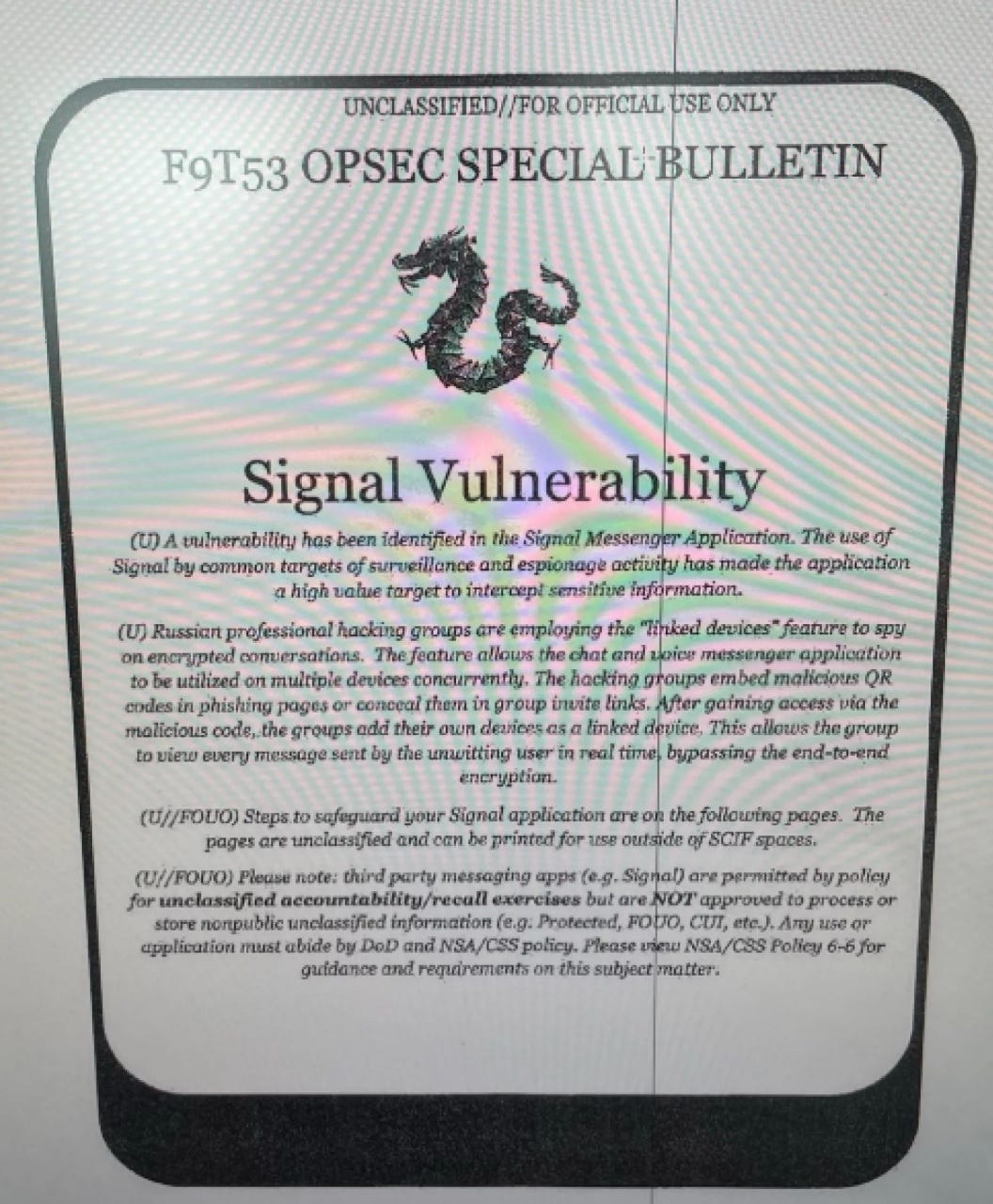
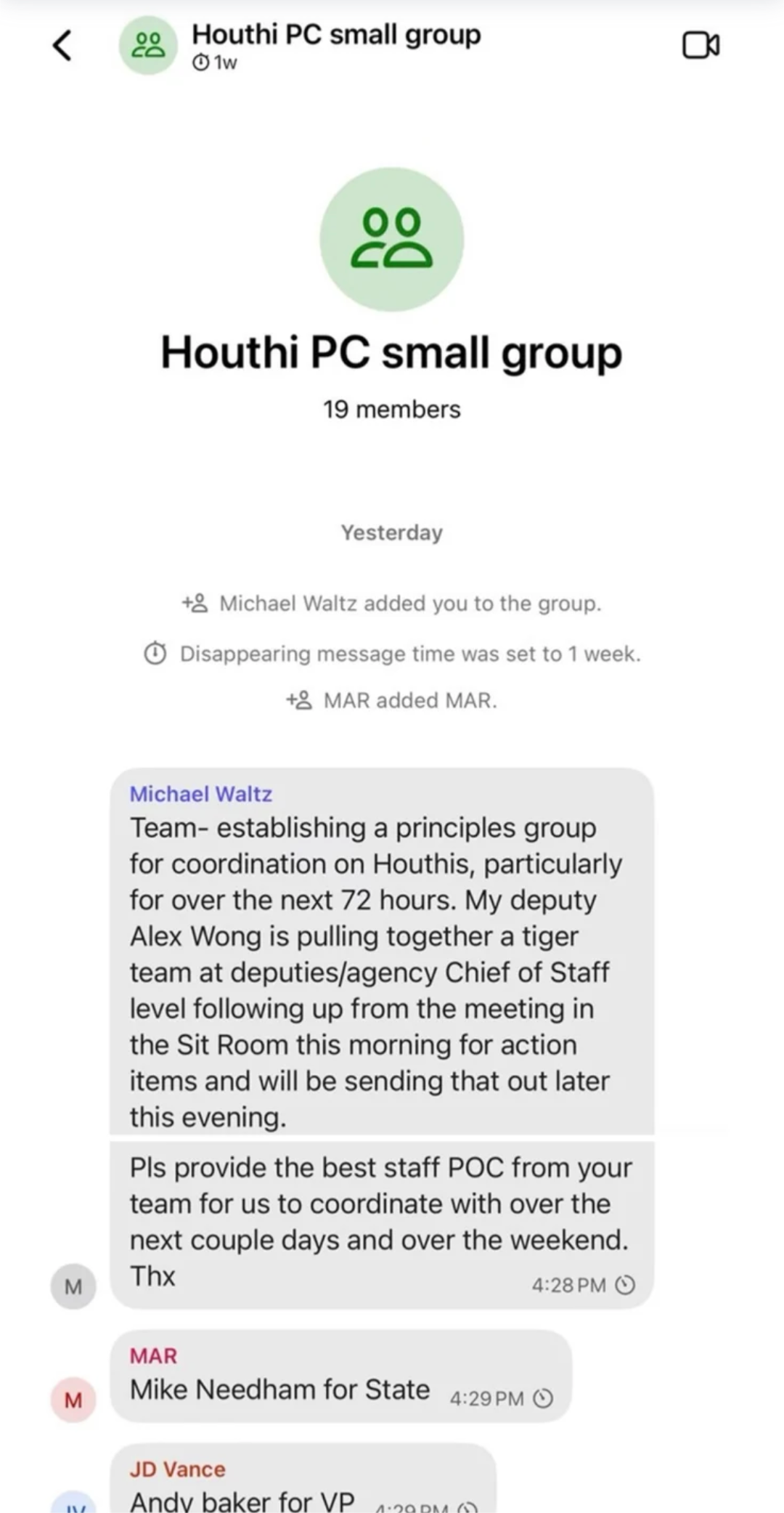
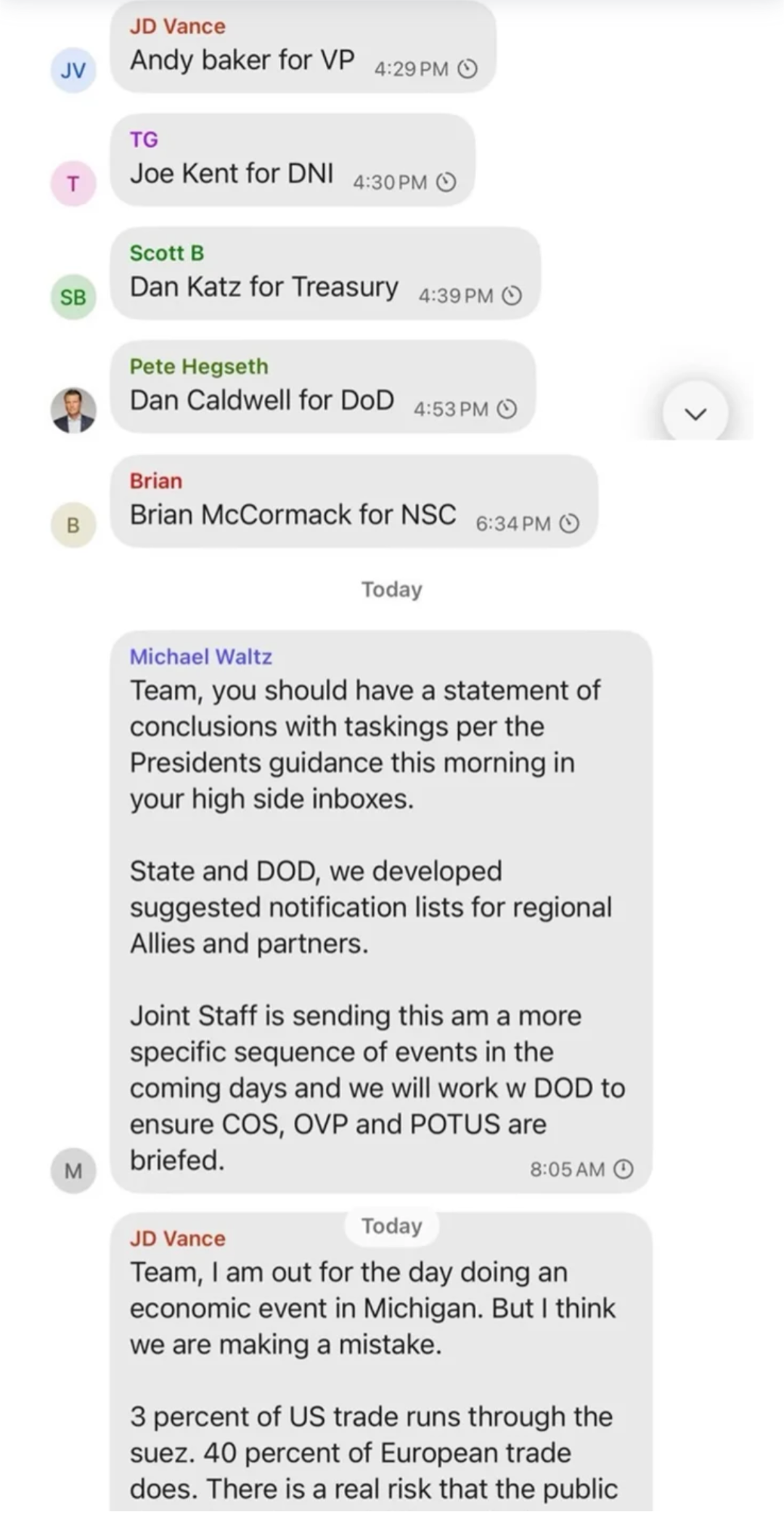
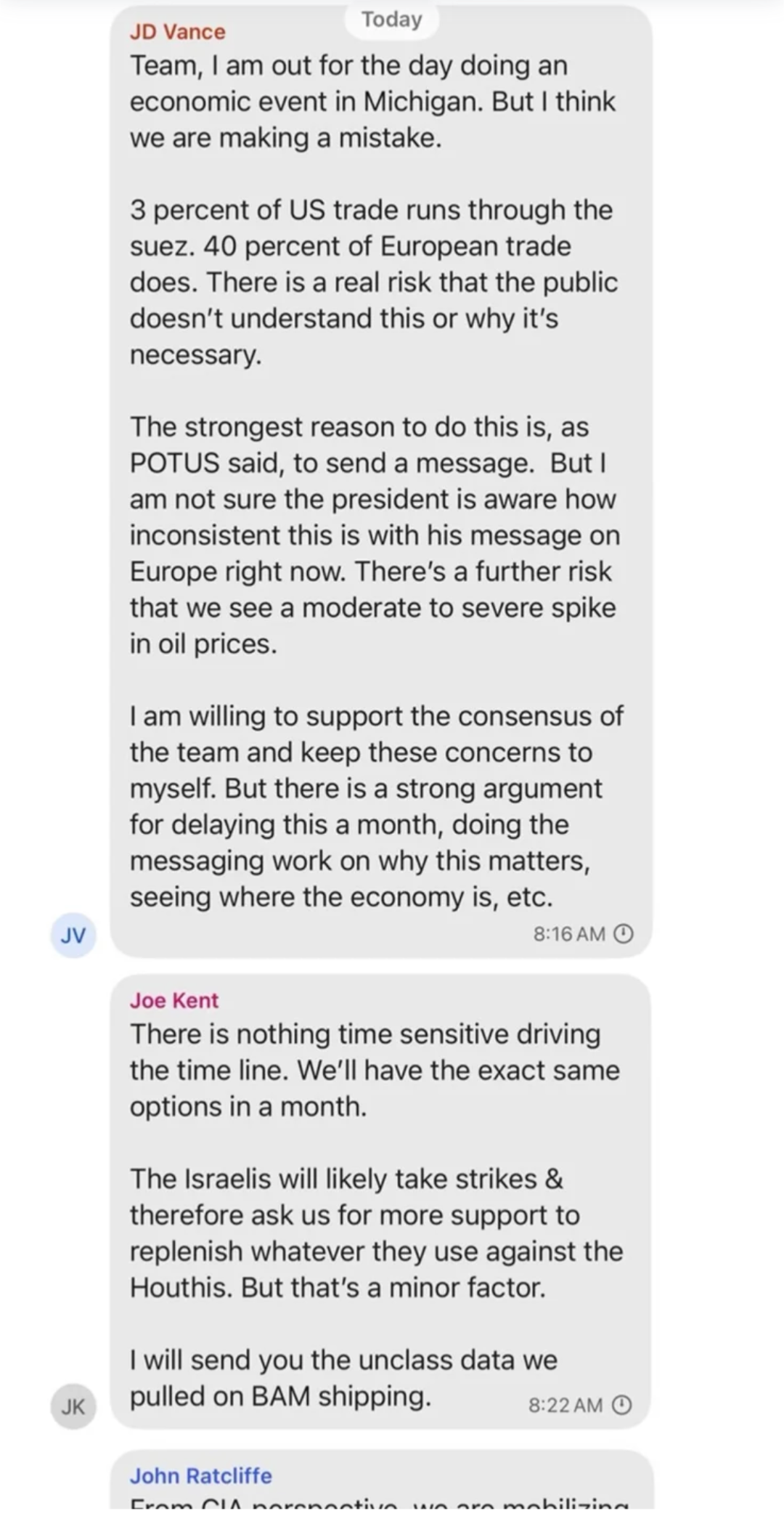
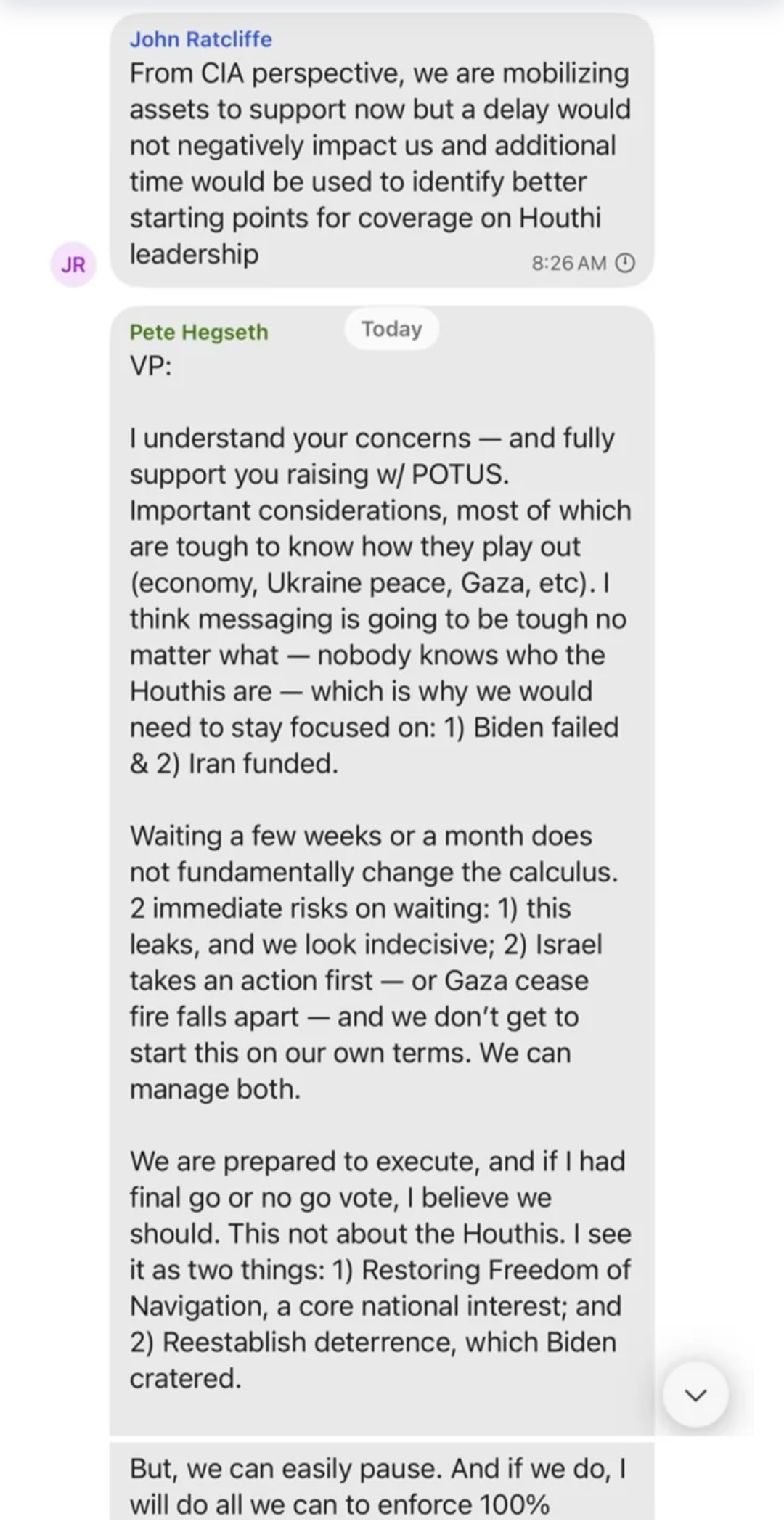
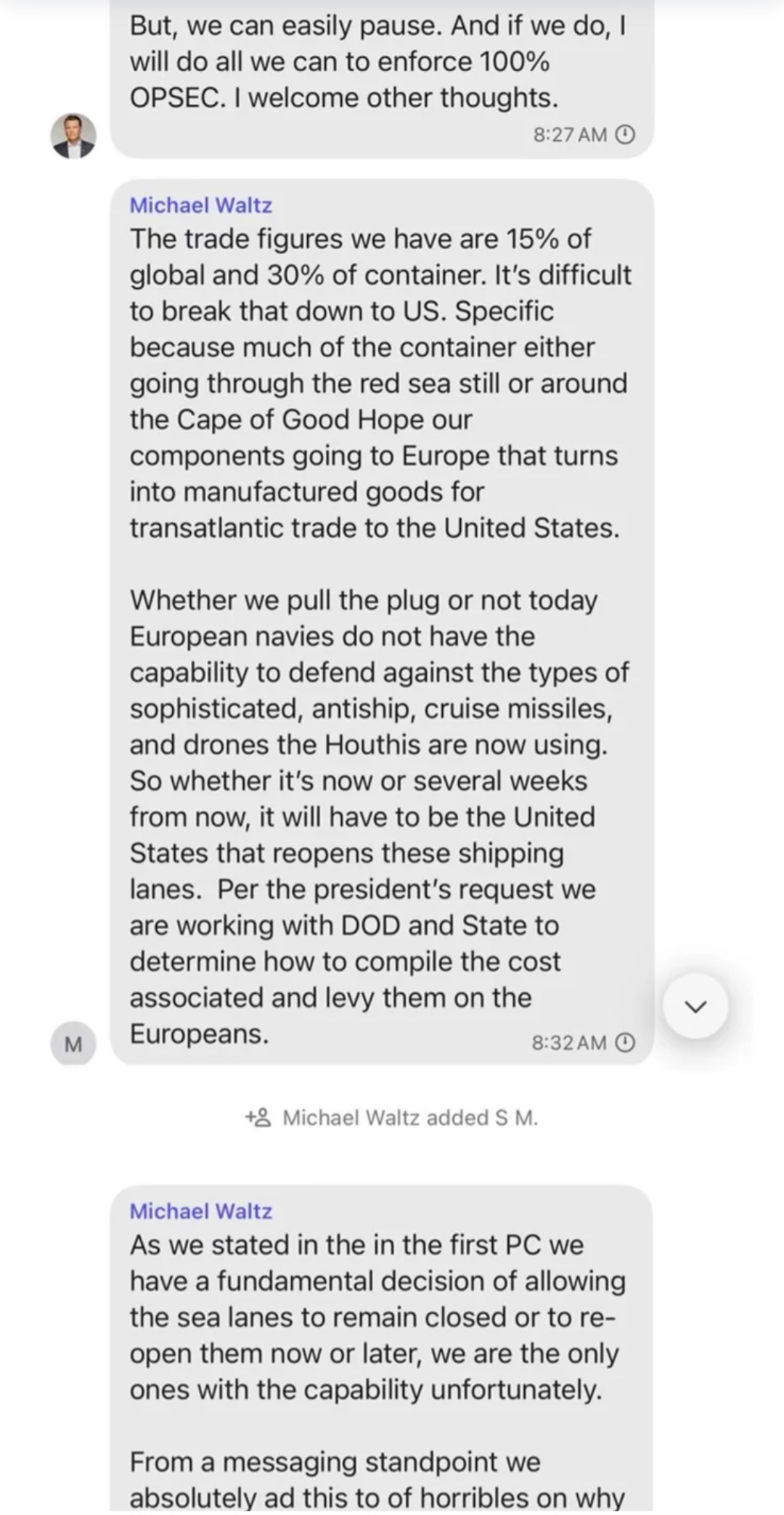
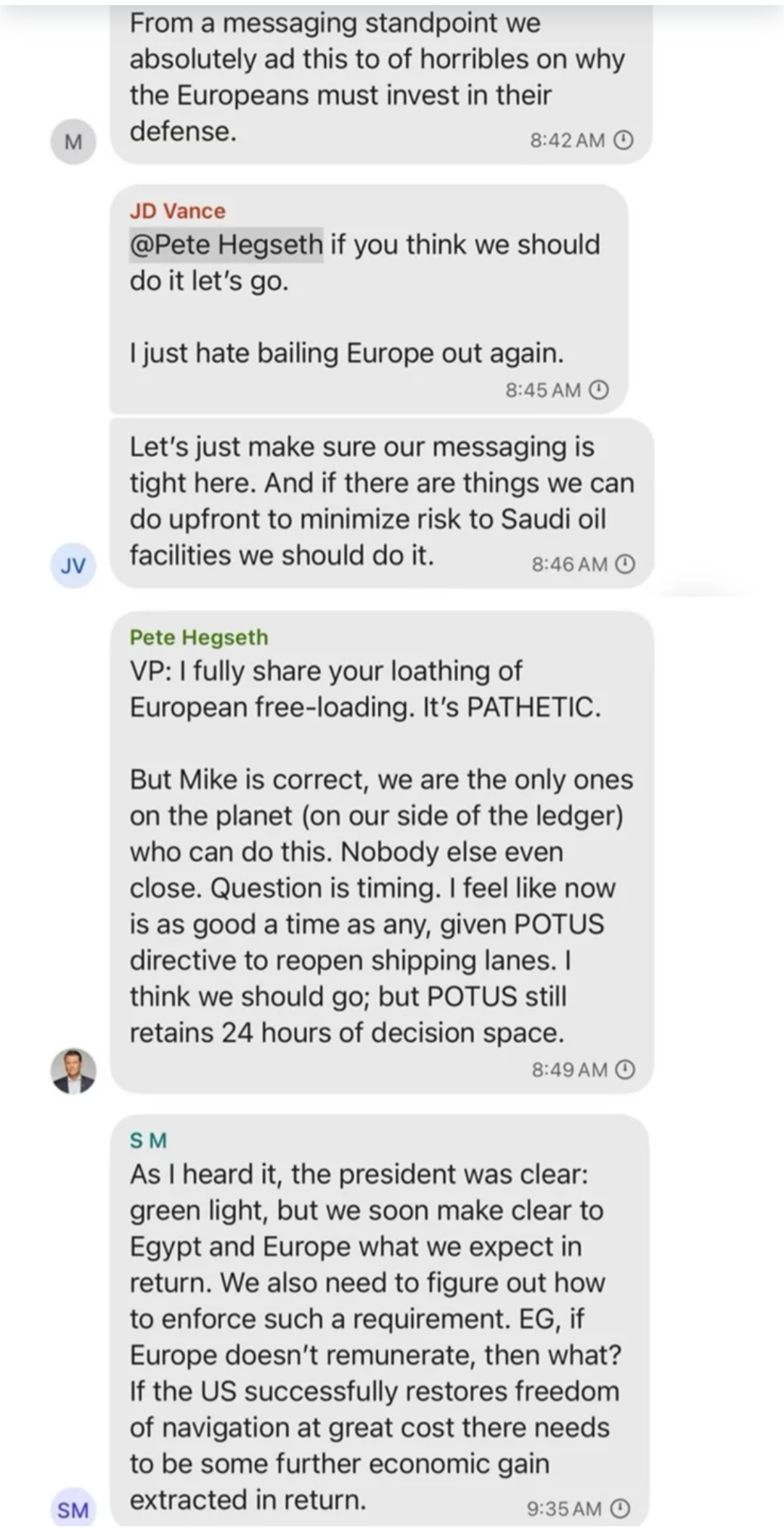
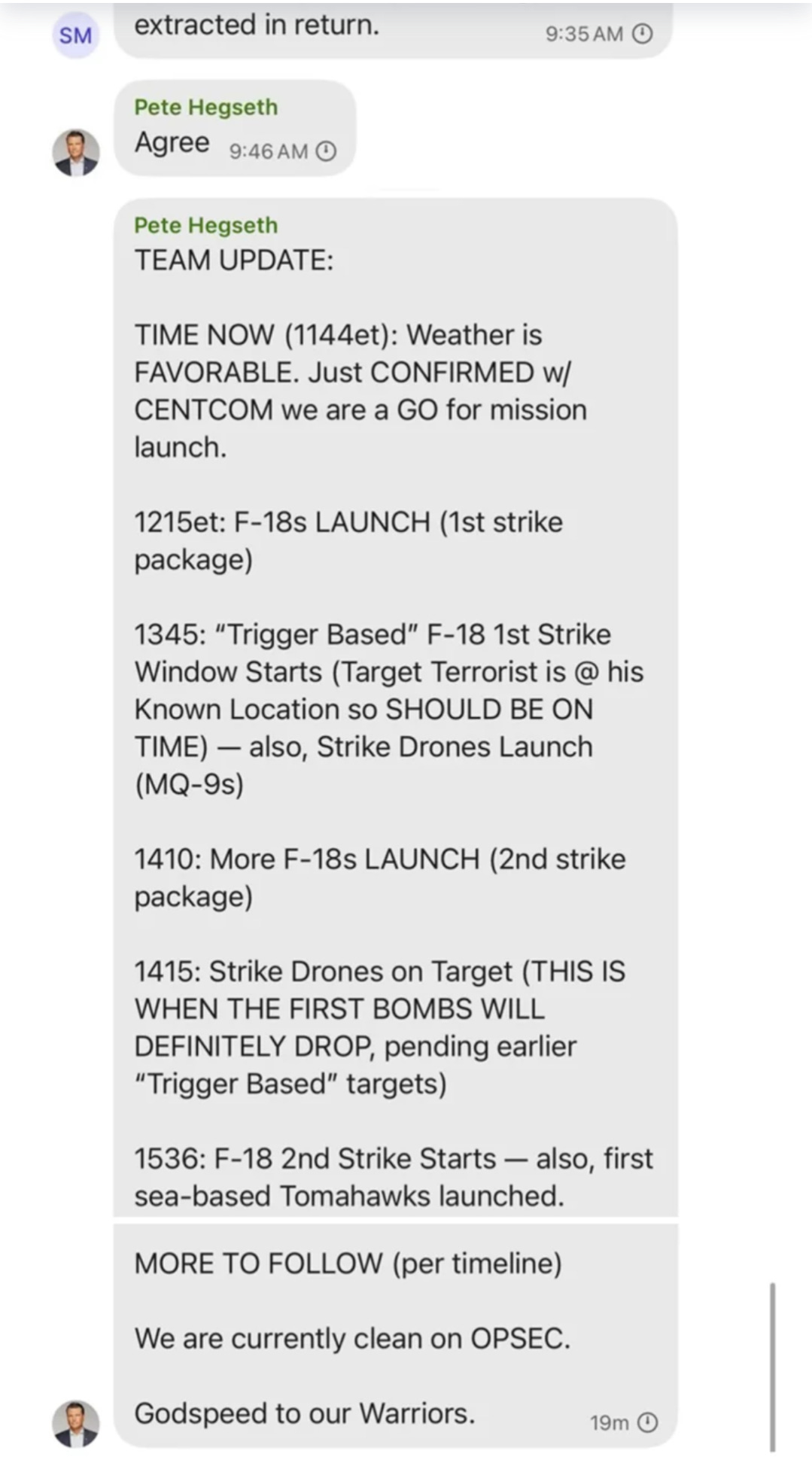
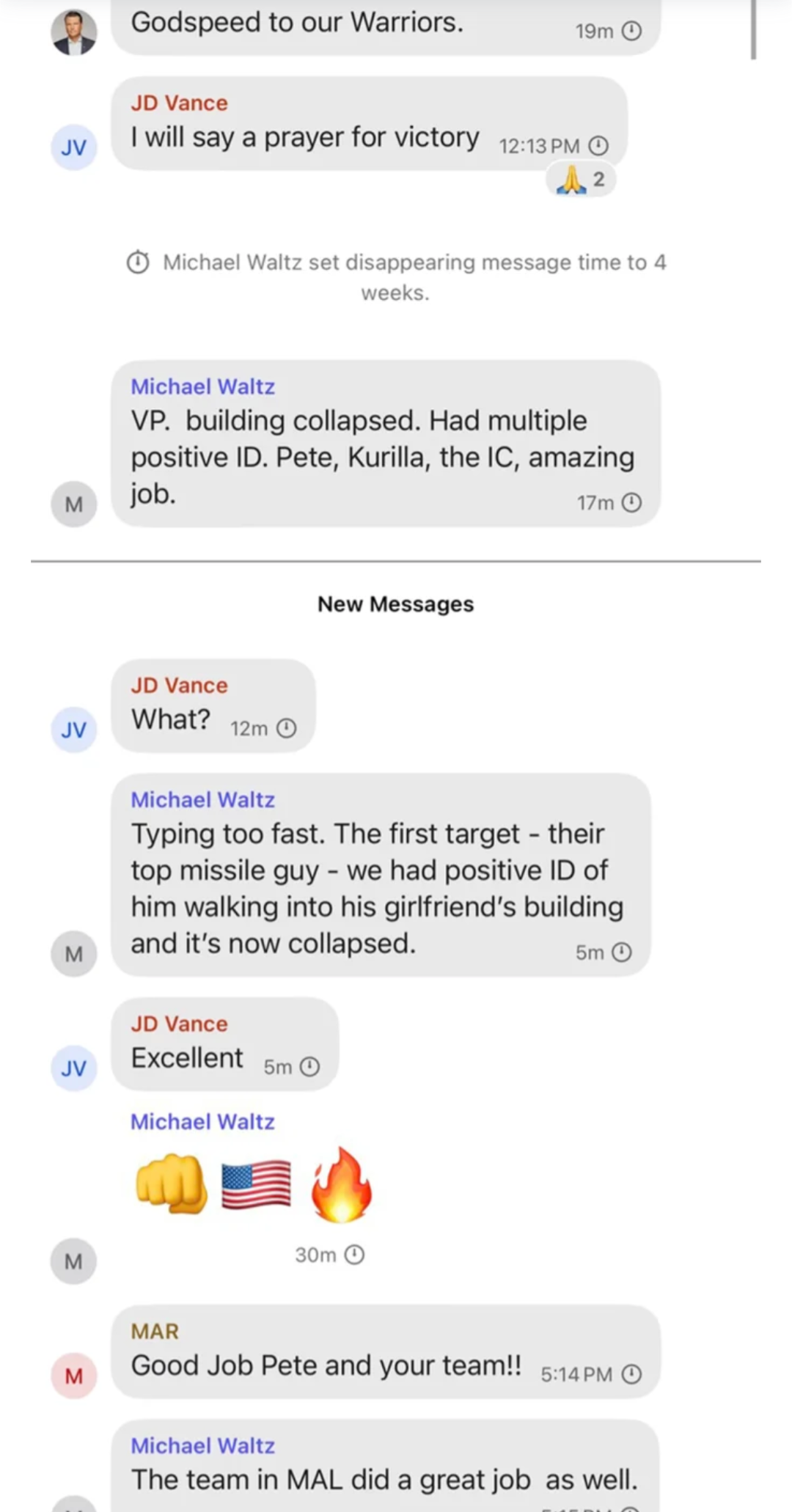
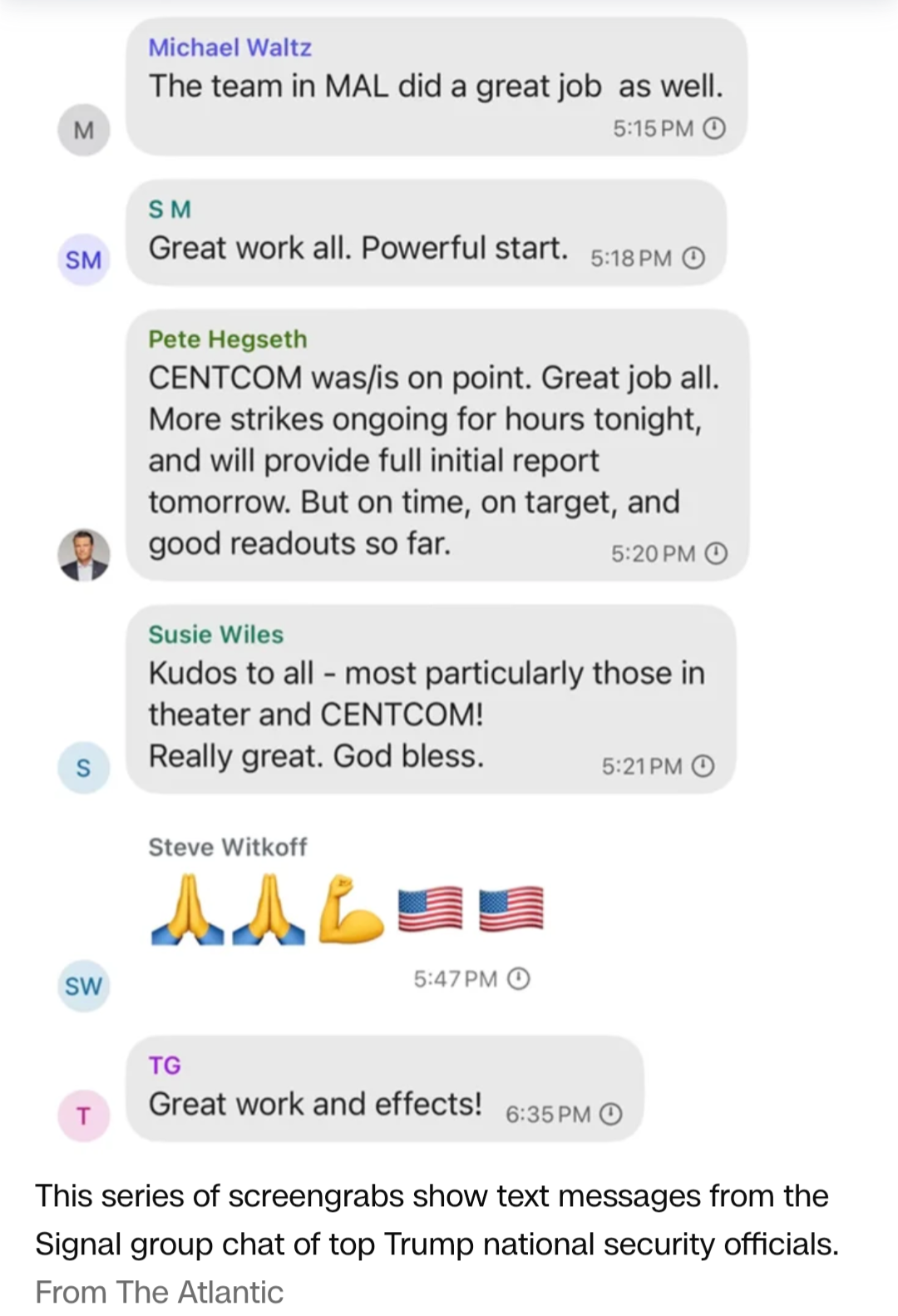
Thank you for taking the time to break it all down for us. We all need to understand what's important, and what's really going on. How do we get the word out to more people?